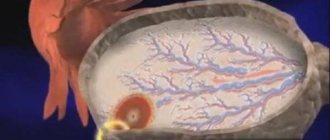A delay in menstruation is considered an invariable sign of pregnancy, as well as the fact that the lower abdomen is pulled at the same time, but sometimes a test carried out in such a situation turns out to be negative. This situation can be considered a serious reason, which requires immediate contact with a doctor. In this case, one should also take into account the presence of such signs as the appearance of nausea and pain, because in fact they can indicate a developing pathological process.
Reasons
If there is a delay in menstruation and at the same time there is tension in the lower abdomen and lower back, and the test is negative, then in such a situation a female representative should still undergo an ultrasound examination in order to accurately exclude a possible pregnancy. In addition, if such signs appear, it is best for a woman to immediately seek advice from a specialist.
You should seek advice from a highly qualified specialist if your lower abdomen is tight and painful; the test indicates a negative result if your period is delayed by 7 to 10 days.
In some circumstances, such symptoms may indicate completely harmless factors. Basically, their elimination helps to normalize and stabilize the menstrual cycle.
If your period is late and the test is negative, you should undergo an ultrasound examination in order to accurately exclude a possible pregnancy.
The following situations can lead to such a situation and contribute to the absence of menstruation:
- systematic consumption of significant doses of alcoholic beverages;
- constant stressful situations that provoke excessive anxiety;
- lack of oxygen, which is caused by short and rare stays in the fresh air;
- unbalanced diet, when preference is given to the consumption of harmful foods that contain a huge amount of preservatives, synthetic additives, and taste enhancers;
- lifting disproportionately heavy objects;
- smoking.
In a situation where a woman has a stomach ache, as during menstruation, and there is a delay, this condition can in most cases be provoked by the stress she has experienced. Among other things, this condition can occur in women who lead an unhealthy lifestyle.
To normalize your menstrual cycle, you need to completely give up bad habits.
To get rid of this manifestation, a woman is recommended to radically change her lifestyle and completely abandon bad habits.
If this does not help to cope with the situation, then in this case you should definitely seek medical help, especially if the woman exhibits the following symptoms:
- a delay in menstruation lasts more than 10 days and at the same time pulls the lower abdomen;
- deviations from the norm in the menstrual cycle are persistent;
- there is no discharge for several months and pregnancy has been ruled out by a specialist;
- when menstruation is delayed, the lower abdomen is very tight, aching and painful, while white discharge is observed from the vagina, and the test result is negative.
Delayed menstruation and pregnancy
There is a definite connection between delay and pregnancy. It is important for every woman to make the connection on her own in order to know for sure when she urgently needs to see a doctor:
- Delay 3-5 days. It’s worth waiting another 4-5 days, perhaps your period is about to come.
- Delay 7-10 days. You need to get tested for hCG or buy a test. If the test readings are negative, you can wait another 6-7 days.
- Delay 2-3 weeks. Repeat the test, take the hCG test again. If the tests are negative, you can wait about 1 more month.
- Delay 1 month. Conduct an hCG test if it has not yet been done. If the diagnosis is negative, you can wait up to 2 months.
- Delay 3-6 weeks. This is already amenorrhea or the presence of serious illnesses, chronic inflammation of the ovary, or, at best, pregnancy. If your period does not come for more than 3 months and the test is negative, then you need to undergo a detailed examination.
If the results of the test and analysis for hCG are positive, you should also consult a doctor immediately. An ectopic pregnancy can be dangerous, and this fact should be excluded with the help of a gynecologist in the early stages of pregnancy.
If the test result is positive and a few days after the delay, spotting and abdominal pain appear, then a miscarriage is suspected. You need to urgently visit a doctor.
You can talk about pregnancy only 3 weeks after conception. If there is no period, but pregnancy develops, then it can no longer be stopped using emergency methods of contraception and folk remedies. There is no need to terminate the pregnancy yourself, it is very dangerous.
Menstruation does not occur after the first sex for the following reasons:
- It is after the first sex that the likelihood of pregnancy is very high. If you don’t have your period and more than 5 weeks have passed since your first sex, you can buy a test and get checked.
- The first sex is usually exciting; the delay may be due to a psychological problem. If the cause is only stress, your period should come.
- If sex occurred before the age of 15, then it is possible that the cycle has not yet fully formed and there may be a delay that is in no way related to pregnancy.
A nursing woman may not have periods for up to 1 year, and this is a completely normal physiological process (replacement of periods with the release of breast milk). If a woman does not breastfeed, her period may begin 3-4 months after birth, which is also quite normal.
Women should not forget that even with breastfeeding, conception is quite possible, so it is worth taking precautions, using contraceptive methods, and consulting a doctor. A new pregnancy a few months after childbirth is undesirable and leads to severe exhaustion of the woman’s body.
Delay
A healthy female body works harmoniously, and menstruation comes regularly, but if there are any deviations, various types of failures occur.
When a woman’s period is delayed for more than 5 days and her lower abdomen is tight, the first thing the woman thinks about at such a moment is the onset of pregnancy. Currently, it is possible to determine the presence of pregnancy using a special test already on the third day of the delay, but it should also be taken into account that even the most expensive and ultra-sensitive test can make mistakes, therefore, you should not completely rely on its result.
To make sure whether pregnancy has occurred or not, you should consult a gynecologist, who, to determine the presence of pregnancy in the female body, will prescribe the woman to undergo an ultrasound examination, as well as donate blood for the hCG hormone.
If on the 6th day a woman still continues to have abdominal pain, and with a negative test, the delay still persists and the hCG is positive, then the development of an ectopic pregnancy should be assumed. This pathology is characterized by the fact that the attachment of the fetus occurs not in the uterus, but outside it.
Note! In most cases, diagnosing an ectopic pregnancy is very difficult, especially if the embryo is in the peritoneum.
Among other things, ectopic pregnancy is also accompanied by symptoms such as dizziness, nausea and fatigue.
Experts recommend immediately contacting a doctor if a woman experiences the following signs of an ectopic pregnancy:
- dizziness;
- nausea;
- the delay in menstruation is 3-4 days, while the lower abdomen hurts and pulls as during normal menstruation;
- spotting or bloody discharge appears, which is completely different from menstrual discharge.
If at least one of the above signs appears, you should under no circumstances hesitate and should consult a gynecologist.
Reasons for delay of menstruation by 6 - 7 days
Menstruation is monthly uterine bleeding. Menstruation is part of a woman's body cycle that supports the woman's body's ability to become pregnant.
The menstrual cycle is maintained by certain hormones that are produced in the brain, in the ovaries of women. In the first fourteen days, the germ cell matures, preparing for fertilization. When this does not happen, the layer of the uterus is rejected and leaves the body in the form of bloody discharge.
A delay is the expected period when your period should come, but this does not happen. When your period is 6 days or more late, many women immediately begin to suspect that they may be pregnant. This especially happens to those who have a regular cycle.
They get used to one routine and are ready to feel certain symptoms by the time their period arrives. In any case, whether a pregnancy is desired or not, everyone has a moment of panic. If there is a delay of 6 days or a delay of 7 days or more, a lot of questions begin to scroll through your head - what to do next, I was taking pills at that time, how did this happen, etc.
So, the first thing a woman thinks about when there is a delay is that she is most likely pregnant. In order to exclude or confirm the fact of pregnancy, you need to take a test, which can be purchased at any pharmacy.
To be sure, you can do several tests every two days. The test can show results after 6, 7 days of missed period, but also after fourteen days. For a more accurate result, you need to take a hCG test or consult a specialist.
Gynecological diseases
When a woman’s body experiences pain in the lower abdomen, but she has no discharge, this may indicate the development of gynecological diseases in the body. Additional signs may also indicate the occurrence of this type of pathology, such as:
- the appearance of vaginal discharge, which has an unpleasant odor and also becomes brown or bloody;
- pain appears in the lumbar region, as well as in the abdomen, which can be of varying degrees of severity;
- discomfort appears during urination and sexual intercourse;
- a feeling of itching and burning appears in the area of the intimate organs, and the skin in the perineal area begins to itch;
- Menstrual flow is delayed for several days.
Why does it hurt?
- Oophoritis. This is an inflammation of the epididymis that causes pain in the lumbar region.
- Salpingitis. This is inflammation of the fallopian tubes. He needs to be treated urgently, because... even the slightest delay can threaten complete infertility, uterine rabies or complete frigidity.
- With inflammation of the ovaries themselves. This disease is called salpingitis. If treatment for the disease is not started within 1 week after the delay begins, the risk of infertility increases by 90%.
- Vaginitis. Typically, pain in the lumbar region is not typical for vaginitis. Instead, the causative organ hurts, and the unpleasant syndrome is accompanied by itching and burning. Along the way, you may notice discharge from the vagina. Inflammation is no less insidious than the previous one. But due to the fact that it is quite easy to diagnose, it can also be cured.
- Ovarian cyst.
Pain does not occur in the lower back itself, but in the organs adjacent to it, since neither the uterus nor the kidneys have their own nerve endings; they send signals specifically to the lower back. Depending on whether the pain is aching, nagging or acute, you can determine the type of disease.
Gastrointestinal pathologies
When a woman has a tightening in her lower abdomen, as during menstruation and the delay is 1-2 days, this may confirm damage to the gastrointestinal tract. These may be pathological processes such as colitis, appendicitis, hernia, or the formation of adhesions. To make an accurate diagnosis, you must immediately contact a medical facility.
The diseases listed above may also be accompanied by additional symptoms, such as bloating, constipation, diarrhea, fever and pain in the lumbar region.
Diseases associated with the gastrointestinal tract
A delay in menstruation can also occur due to certain disorders in the peritoneal area. They may be as follows:
- hernias or adhesions in the intestines;
- inflammatory processes in the intestines;
- intestinal oncology, as a consequence the appearance of tumors;
- inflammation of appendicitis.
If the disease is associated with the gastrointestinal tract, then in addition to the absence of four to five days of menstruation, other symptoms will appear:
- sharp, cutting pain in the lower back and abdomen;
- nauseated, possible vomiting;
- there is often constipation or diarrhea, there may be bloating;
- elevated temperature.
As you can see, a delay in menstruation, a negative test (pulling the lower abdomen and lower back) can be due to completely different diseases. Some pose no threat, others are extremely dangerous, but in any case, the body signals a failure and needs help. Be sure to consult a doctor so that you can start treatment on time and not start the disease, because there may be complications accompanied by unpleasant consequences.
Source
Features of the female body
The absence of menstrual flow, which is accompanied by pain in the lower abdomen, can also be caused by the following factors:
- during prolonged use of antibacterial drugs;
- as a result of menopause, which occurs in every female body at a certain period of time;
- as a result of taking medications intended for emergency contraception;
- during the period of adaptation to a new oral contraceptive or as a result of its cancellation;
- after curettage or as a result of the development of various kinds of complications after forced or natural termination of pregnancy;
- during treatment of cervical erosion;
- after hysteroscopy or colonoscopy.
A disruption in the menstrual cycle, which is accompanied by pain in the lower abdomen, may also confirm developing problems with the endocrine system.
Among other things, various chronic diseases can lead to a delay in menstruation. That is why it is best not to ignore these types of signs and not to put off visiting a doctor. Since only timely diagnosis and effective treatment will help to avoid the development of serious pathological processes and complications that can lead not only to health problems, but also death.
A timely and qualified examination, as well as a correct diagnosis as a result of diagnostic procedures prescribed by a specialist, and effective treatment will allow you to maintain health and get rid of the disease without any consequences.
Why does the lower abdomen pull like during menstruation?
Pulling in the lower abdomen as during menstruation as a result of various diseases - and not only of a gynecological nature. And sometimes such a feeling is considered a variant of the norm. When should you not worry?
This happens during ovulation. If the lower abdomen pulls in the middle of the cycle, and the pain is not pronounced, does not last long, and there are no other signs of the disease, we can assume that the problem is precisely this, ovulation. It should be taken into account that pain most often occurs in the area of one ovary where ovulation occurred, that is, only on one side of the abdomen. And the malaise may persist for no more than 1-2 days.
Other symptoms to take into account.
1. Bloody discharge.
3. Nausea, diarrhea.
4. Pain during and after urination.
Their presence may already indicate a number of diseases. It is clear that nausea and diarrhea most likely indicate an intestinal infection. Although, this can also happen with appendicitis. Those who have not had their appendix removed should consider this option. At the beginning of the inflammatory process, there may be pain from different sides of the abdomen and not having a clear localization.
If there are any symptoms of pregnancy, pulling in the lower abdomen, and bleeding from the vagina, then this may well be a sign of a miscarriage. If this happens, you should tell your doctors that you may be pregnant. If the child is desired, it is necessary to urgently do an ultrasound.
And if the lower abdomen feels like it’s during menstruation, but there is no menstruation, the test is negative, but there were unprotected sexual intercourses - it’s worth additionally donating blood for hCG. This can be done without a doctor's referral at any commercial clinical laboratory for a small fee. This way you will know for sure whether there is a pregnancy, both uterine and ectopic (with it, the hCG level also increases). After the delay begins, an ultrasound examination will also be informative.
What other reasons could there be a delay?
In addition to all of the above reasons leading to the absence of menstruation, the following can be assumed:
- long-term use of antibiotics;
- undergoing hysteroscopy, colonoscopy, cauterization of erosion;
- abortions, miscarriages, the delay can be up to 2-3 months; if curettage occurs after this period, you need to consult a doctor for examination;
- the use of contraceptives, such as Miren, Medroxyprogesterone Acetate, Jess, Yarina (menstruation may be absent for up to 2-3 months from the start of taking them; this is normal, you should not stop taking the drugs);
- emergency contraceptives may cause a delay;
- age 40-45 years, when the functionality of the ovaries slows down (menstruation is irregular, the probability of pregnancy is no more than 5%; a slow onset of menopause is possible if the intervals between menstruation increase sharply and become constant).
The onset of menstruation may be delayed by 5-6 days, or they may not occur at all due to inflammatory processes in the kidneys: pyelonephritis, cystitis. In addition to the delay, fever, itching, burning in the vulva, and abdominal pain are often observed. The balance of internal organs is fragile, often affecting the cyclicity of menstruation.
Delay can be caused by appendicitis, adhesions, hernia, inflammation of the intestines, tumors of the gastrointestinal tract, and cancer.
With diseases of the gastrointestinal tract, nausea appears, the stomach hurts and cuts, and menstruation may also be absent. Many different factors can cause a delay. Not all of them are dangerous, but you should still not be prejudiced.
Sometimes treatment does not require delay. It’s good to be a knowledgeable and competent person, but no one except an experienced doctor will give the necessary recommendations. You may need to undergo lengthy and complex diagnostics. Do not forget that the lack of treatment leads to serious, sometimes irreparable consequences.
Critical days are not the most pleasant thing that can happen in a woman’s life. But their “non-appearance” is annoying and does not allow you to calm down, since it is important to understand and figure out what caused their “non-appearance”. The onset of pregnancy is not always to blame. Sometimes a woman is overtaken by serious diseases of the genital organs, which answer the question of why there are no periods and lower back pain.
Menstrual cycle in women
The first menstruation in girls appears at the age of 11-13 years. With a hereditary predisposition and early maturation of the reproductive organs, menstruation may appear at 8-9 years of age. The irregularity of the cycle at this age is explained by the activity of hormonal levels, so the absence of menstruation in adolescence is considered normal.
Important! Stabilization of the menstrual cycle in adolescents occurs in approximately 6-8 months. If this does not happen, you should visit a pediatric gynecologist and get tested for hormones and hidden gynecological diseases.
In women of reproductive age who do not have health problems, the cycle ranges from 28 to 35 days. The countdown must begin from the beginning of the first menstruation. Doctors consider 1-2 days an acceptable deviation from this norm. If cycle failure occurs regularly, the woman needs a full examination in a hospital setting. Delaying the time to seek medical help is fraught with infertility and other health problems. Even if a woman has already given birth, you should not take this problem lightly, since a delay in menstruation in combination with painful sensations in the abdomen and lower back can indicate serious pathologies that can lead to the development of cancer.
Physiology of the menstrual cycle
On what day of delay should the test be done?
Most often, a delay in menstruation, if it occurs for the first time, means pregnancy, especially if a woman experiences nagging pain in the lower abdomen. A special test for home diagnostics can be done on the first day of the delay, since most of them are highly sensitive to hCG contained in the urine. But in some cases, the test may show a false result at short gestational ages, so to get a more accurate result it should be done after 3-5 days.
To get the correct result from the first day of absence of menstruation using home test strips, you must follow these recommendations:
- The test must be done in the morning immediately after waking up, since at this time the concentration of hCG reaches its maximum value;
- the container in which urine is collected must be sterile;
- Before the procedure, you must wash yourself thoroughly using gentle, fragrance-free products;
- to evaluate the result, the strip must be held horizontally with the test zone facing upward;
- the used strip should not be placed near sources of high temperatures, as this may distort the result;
- The maximum time to evaluate the result is 10 minutes.
How to take a pregnancy test
On the tenth day after the absence of menstruation, any test will show a reliable result, but to be on the safe side, it is better to contact an antenatal clinic.
Video: Signs of an ectopic pregnancy
Main signs of pregnancy
If your period is 7 days late, and all the signs of pregnancy are evident, the mammary glands swell, the lower abdomen is tight, but the test still shows a negative result, you should wait a few days or try to induce your period. This can be done by eating more greens, doing physical labor, or taking special medications, but only after consulting a specialist.
You can also check whether you are pregnant by measuring your basal temperature early in the morning without getting out of bed. If the temperature exceeds 37 degrees for several days in a row, it means that you are pregnant, the test has simply not yet detected the hCG hormone, or the test was carried out incorrectly.
It is important to be careful about what test you are doing. Conventional test strips can make mistakes if they have expired, if the manufacturing technology was not followed, or if the test was not carried out according to the instructions. The test may be incorrect if you drink a lot of liquid before use.
Main symptoms of pregnancy:
- nausea;
- white discharge;
- pain in the lower abdomen;
- swelling of the mammary glands.
If you have similar symptoms and your period is more than 7 days late, if the test is still negative, you should consult a doctor. It happens that tests do not show the state of pregnancy for a long time, because pathology in the development of the fetus is possible.
Sometimes pain in the lower abdomen indicates a woman’s poor diet and the development of various diseases. Then symptoms such as spotting in the middle of the cycle may appear.
The need to use the test
It seems that taking a pregnancy test is not so difficult, but doubts arise about the accuracy.
- Firstly, you need to wait for the delay, and when you have not had menstruation for more than one day, or better yet, when 6–7 days have already passed, you can safely do a test. Although some tests, according to manufacturers, make it possible to determine pregnancy even before the delay. But it’s worth waiting for certain signs for a more reliable result.
- Secondly, it is better to carry out the test in the morning. In the morning, the best concentration of hCG in the urine.
When the test still shows a negative result, you need to listen to your body. Is it showing any signs?! If there are all signs of pregnancy, feel free to contact a specialist. Many doctors do not trust home tests and may send you for an ultrasound test or a medical examination. Find out how many days of delay indicates pregnancy and how many days ovulation lasts.
Reasons for lack of menstruation
If a woman has any chronic disease and takes pills, antibiotics, this can also cause disruption of the menstrual cycle for more than 7 days if the test is negative. If delays occur frequently, but there are no visible signs of this, then most likely the reason is a disruption in the body’s functioning.
If you do not determine in time what caused this phenomenon, this can lead to unpleasant consequences, including infertility.
When there is no menstruation for more than six months, this disease is called amenorrhea. If such a symptom occurs, qualified diagnosis and treatment are necessary.
Sometimes a delay in the menstrual cycle may be due to illness (cold, etc.). It is not uncommon for this to happen due to positive emotions. A delay may occur due to the fact that you have lost a lot of weight or have gained a lot of weight.
The lack of “red days” is worrying
The delay may be caused by a previous abortion after curettage. This occurs when mechanical force disrupts the integrity of the uterus.
Termination of pregnancy also entails serious hormonal disruptions; sometimes after this, menstruation may be absent for one to two months.
If the test is negative and there is a pull in the lower abdomen
If the test shows one line, and an ultrasound examination confirms that there is no pregnancy, but nagging pain in the abdomen persists, you need to contact a gynecologist. This should be done after 7-10 days of absence of menstruation. In some cases, the delay can be explained by completely harmless factors, the elimination of which leads to the resumption of menstruation and stabilization of the cycle. Lack of discharge can be caused by:
- stress and anxiety;
- an abundance in the diet of harmful foods containing large amounts of carcinogens, preservatives, flavor enhancers, flavors and other synthetic additives;
- insufficient intake of iron and B vitamins, as well as ascorbic acid from food;
- smoking;
- drinking large doses of alcohol;
- lifting heavy objects;
- lack of oxygen (with rare and short walks).
Stress and anxiety can cause missed periods and pain in the lower abdomen
The lifestyle a woman leads is of great importance. Correcting eating behavior, increasing physical activity, and swimming have a positive effect on the functioning of the reproductive system. Reducing the calorie content of the daily diet due to fatty foods, as well as increasing the proportion of vegetables, herbs, fruits and berries in the daily menu helps control the synthesis of estrogen and progesterone - the main sex hormones that regulate the process of maturation of follicles and the release of eggs into the fallopian tube.
Why does my lower back hurt when my period is late?
Lower back pain can occur due to inflammation and injuries in the pelvic area, which delays the onset of menstruation. A delay is quite likely if:
- oophoritis, inflammation of the ovarian appendage;
- salpingitis, inflammation of the fallopian tubes;
- adnexitis, inflammation of the ovaries, fallopian tubes (the delay reaches 5 days; the disease is insidious, quickly becomes chronic, leading to infertility);
- endometritis, inflammation of the uterine mucosa (at the acute stage, the stomach may hurt severely);
- vaginitis, inflammation of the vaginal walls (cutting, throbbing pain, lower back pain, frequent discharge, burning and itching of the vulva);
- salpingo-oophoritis, inflammation of the ovarian appendages and fallopian tubes;
- ovarian apoplexy;
- twist;
- fibroids, ovarian cyst.
Especially often, lower back pain is associated with oophoritis. With adnexitis, the lower back hurts periodically, inflammation is caused by sexually transmitted infections: gonorrhea, candidiasis, in which the acidity of the vagina changes, provoked by the development of the Candida fungus. Discomfort is treated with suppositories and tablets.
The process can be triggered by a fungal infection transmitted sexually by an infected partner: ureaplasmosis, chlamydia and mycoplasmosis.
Nagging pain in the absence of menstruation: possible causes
Almost all causes of pain in the lower abdomen are pathological in nature, so you should not delay a visit to the clinic. For an accurate and correct diagnosis, a woman needs to undergo tests and undergo an examination, which includes a number of procedures performed only in a hospital setting.
Ectopic pregnancy
This is one of the most common reasons causing the absence of menstruation on time. In most cases, a pregnancy test will show a positive result, even if the fertilized egg is stuck in the fallopian tubes, but sometimes this diagnostic method turns out to be inaccurate, and only one strip appears on the surface of the test zone.
Types of ectopic pregnancy
An ectopic pregnancy is a dangerous phenomenon that can lead to rupture of the fallopian tubes at any stage and severe internal bleeding. To prevent the consequences of the pathology from leading to death, it is important to know the warning signs and symptoms. These include:
- pulling or stabbing pain in the lower abdomen and lower back;
- temperature increase;
- nausea, possible single vomiting;
- lack of appetite;
- cold sweat.
All these symptoms require immediate medical attention. Any delay can cause a pipe rupture and the death of a woman (if she is not provided with the necessary assistance in time).
Endometrial pathologies
Endometritis - inflammation of the uterine mucosa - often causes absence of menstruation, which is replaced by prolonged and heavy bleeding. The same clinical picture is characteristic of endometrial hyperplasia, a pathology that leads to excessive growth of epithelial tissue and thickening of the endometrium. Both pathologies are caused by hormonal disorders, so treatment consists of taking oral contraceptives (Yarina, Zhanin, Diane-35) and normalizing nutrition, which helps maintain the synthesis of female sex hormones. Bleeding is stopped using diagnostic curettage.
Hyperplasia and normal endometrium
The woman will also need special nutrition with a high iron content, which is actively lost during prolonged bleeding. To prevent anemia, you need to eat more veal, legumes, buckwheat dishes, and apples. Pomegranate and apple juice, as well as rosehip decoction, are useful.
Important! Using hematogen as a source of iron is only permissible if you are of normal weight. This product is contraindicated for women with carbohydrate metabolism disorders and excess body weight.
Sexual infections
The most common female problem is thrush. This disease is caused by yeast fungi of the genus Candida, so the medical name for thrush is candidiasis. The growth of pathogenic flora is facilitated by changes in the acidity of the vaginal environment and the death of lactic acid bacteria, which maintain an optimal balance of microorganisms on the surface of the mucous membranes of the genital organs. A common cause of this disease is poor hygiene and the use of care products that are not suitable for intimate hygiene. Frequent washing and douching also dry out the vaginal mucosa, creating favorable conditions for the growth of fungus.
Any sexually transmitted infections (gonorrhea, chlamydia, trichomoniasis) are accompanied by additional symptoms, so it is quite easy to suspect their presence.
Symptoms of gonorrhea in women
Symptoms of sexually transmitted infections
| Sign | Consistency of discharge | Discharge color | Smell | Painful sensations |
| Candidiasis | Curdled, possible inclusions and lumps | White, cream | May be absent, but more often there is a sharp sour milk smell (reminiscent of spoiled kefir) | Burning and itching in the perineum, vagina or anus, nagging pain in the lower abdomen |
| Gonorrhea, chlamydia, trichomoniasis | Thick | Green, yellow, brown | Putrid, “fishy”, pronounced | Cravings when emptying the bladder, pulling sensations in the lumbar region |
| Viral infections |
Sexual infections must be treated immediately. If the disease becomes chronic, complications cannot be avoided.
Inflammation of the appendages
Inflammation of the appendages in women
At the initial stage, inflammatory processes in the fallopian tubes and appendages (adnexitis) are accompanied by slight nagging pain in the lateral part of the lower abdomen. As the pathology progresses, the intensity of the pain increases and it becomes acute and stabbing in nature. It is difficult to stop such sensations on your own, since this requires eliminating the cause, that is, getting rid of inflammation.
The delay with adnexitis can range from 3 to 7 days. By the end of this period, the pain becomes almost unbearable and reduces motor activity, so the woman requires qualified assistance in a gynecological hospital.
Important! Incorrect or insufficient treatment of adnexitis in 50% of cases ends in infertility and disturbances in the functioning of the reproductive organs.
Appendicitis
Sometimes a slight delay in menstruation and nagging pain may be the first signs of inflammation of the appendix. When the catarrhal stage ends, the pain becomes diffuse and intense. You can distinguish appendicitis by its characteristic position: the woman tries to lie on her left side and pulls her knees towards her stomach.
The absence of menstruation on time can be a completely harmless phenomenon that goes away after all provoking factors are eliminated. But if the delay is accompanied by pain, you need to go to the hospital as soon as possible. Effective treatment of any gynecological diseases is possible only in the initial stages, so any delay in this matter is unacceptable.
| Rotten egg smell | Mild itching may occur |
Reasons for the absence of stripes when menstruation does not occur
There are several reasons why there is a delay in menstruation and the test is negative. Let's start with the physiological ones:
- Lactation. The hormone prolactin, responsible for milk production, blocks ovulation and menstruation stops. There is no period, but the pregnancy test is negative - this is normal when breastfeeding.
- Abortion. Medical termination of pregnancy is accompanied by bleeding and often leads to a shift in the cycle. A one-time 2-week delay after an abortion is not considered a deviation.
- Climate change. When adapting to new conditions, a one-time delay of up to 12 days should not cause concern.
- Climax. Menstruation becomes irregular, it can come once every 2 months - this is a sign of the decline of the reproductive sphere.
- Overwork and nervous tension. Physical and mental stress can delay the appearance of menstruation.
- Strict diets. The lack of nutrients entering the body makes ovulation difficult, and menstruation does not come.
- Taking hormones. A delay of up to 10 days and a negative test can occur during treatment with hormones or emergency use of special contraceptives after unprotected sex.
When there is no period and the test is negative, the reasons are not always harmless. The reason for the absence of menstruation may be serious pathologies:
- hormonal disorders;
- chronic or acute intoxication;
- polycystic ovary syndrome;
- inflammation of the reproductive organs;
- venereal diseases;
- pituitary tumors;
- endometriosis;
- anemia;
- cystitis.










